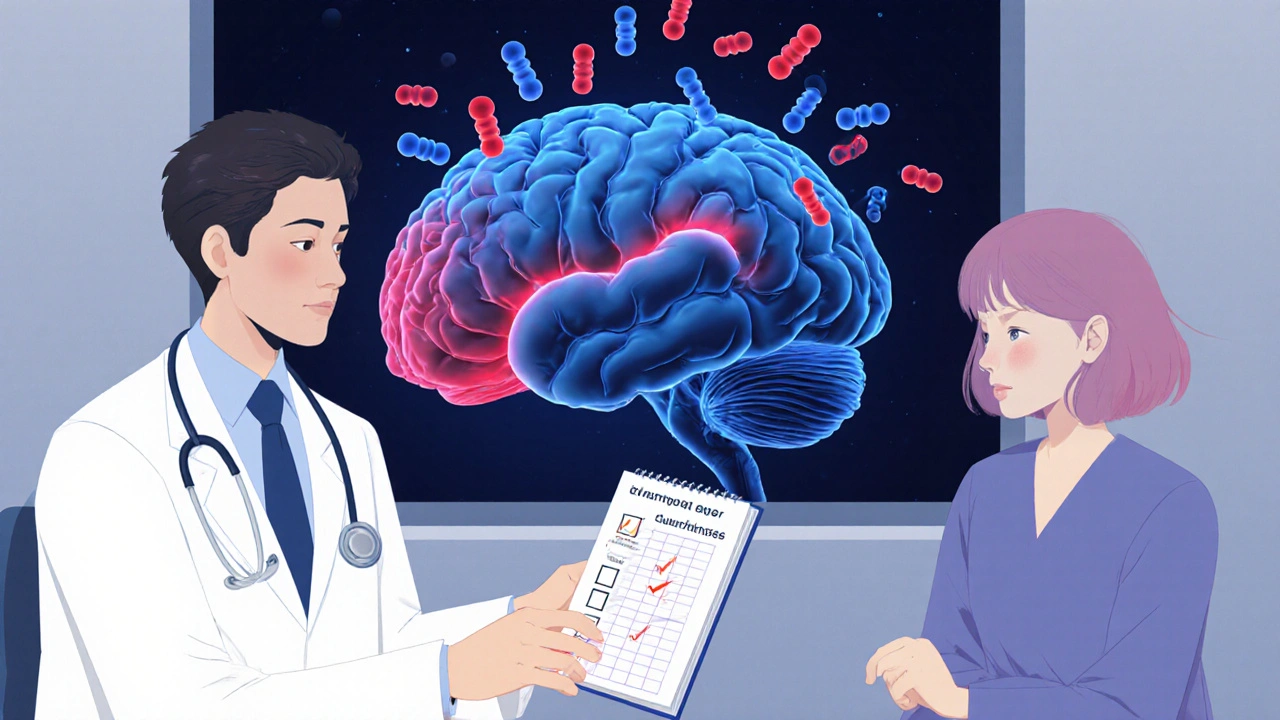
Statin Sleep Risk Calculator
Statin Selection Tool
This tool helps you understand how different statin medications might affect your sleep based on their lipophilicity. Select your current statin or consider alternatives.
Why Lipophilicity Matters: Fat-soluble statins (lipophilic) like simvastatin can cross the blood-brain barrier more easily, potentially disrupting sleep and dreams. Water-soluble statins (hydrophilic) like pravastatin have less brain impact.
Simvastatin
High lipophilicity
Pravastatin
Low lipophilicity
Studies show patients often experience improved sleep when switching from simvastatin to pravastatin while maintaining cholesterol benefits.
More than 300 million people worldwide take statins every year to lower cholesterol and reduce heart attack risk. But if you’ve been on one and suddenly started having trouble falling asleep-or waking up from wild, detailed dreams-you’re not alone. Thousands of patients report the same thing. The question isn’t whether it happens. It’s why it happens, and whether you need to stop your medication.
It’s Not Just in Your Head
Some doctors will tell you that sleep problems from statins are just the nocebo effect-meaning you expect side effects, so you feel them. But that’s not the full story. In a 2007 study led by Dr. Beatrice Golomb, 1,016 people were randomly assigned to take simvastatin, pravastatin, or a placebo. Those on simvastatin reported significantly worse sleep quality than the others. The placebo group? No big difference. And here’s the kicker: pravastatin, a different statin, didn’t cause any sleep issues at all. This wasn’t a fluke. A 2014 analysis of FDA and Japanese adverse event databases found simvastatin was more than twice as likely to be linked to sleep problems compared to other statins. Lovastatin had similar risks. But atorvastatin? No clear link. Rosuvastatin had a moderate risk. The pattern points to something deeper than psychology.Lipophilicity: The Hidden Factor
Statins aren’t all the same. Some are fat-soluble (lipophilic), others are water-soluble (hydrophilic). Lipophilic statins like simvastatin and lovastatin can cross the blood-brain barrier more easily. That means they can interact with brain chemistry-possibly affecting the parts of your brain that regulate sleep and dreams. Think of it like this: if a drug can get into your brain, it can mess with your sleep cycle. Hydrophilic statins like pravastatin and rosuvastatin mostly stay in the bloodstream. They don’t sneak into your brain as easily. That’s why switching from simvastatin to pravastatin often fixes sleep problems-without losing the cholesterol-lowering benefit. A 2024 study presented at the Sleep 2024 conference found that patients who stopped statins because of muscle pain (a common side effect) also saw their sleep improve. Their time awake at night dropped by 15.6%. They woke up fewer times. Their sleep efficiency went up. That’s not just about muscle pain. It suggests a direct link between statin exposure and sleep disruption.What About Vivid Dreams?
Vivid, strange, or even scary dreams are one of the most commonly reported side effects. People describe flying, reliving childhood memories, or being chased by animals. These aren’t random. They happen during REM sleep-the phase where dreaming occurs. Some researchers think statins might affect serotonin or melatonin pathways in the brain, both of which help regulate REM sleep. One Reddit user, u/CholesterolConfused, wrote: “Switched from atorvastatin to pravastatin 3 weeks ago and my crazy dreams stopped immediately.” That’s not an isolated story. On forums and in doctor’s offices, this is a recurring theme. But here’s the twist: not everyone has this problem. Another Reddit user, u/HeartPatient99, said: “No sleep issues on simvastatin for 5 years despite all the horror stories.” So why do some people react and others don’t? Genetics may play a role. Some people metabolize statins differently. Others might have underlying sleep disorders that get triggered by the drug. There’s still a lot we don’t know.
What the Big Studies Say
Large trials involving over 100,000 patients, like the one led by Professor Rory Collins in 2016, found no significant difference in sleep quality between statin users and placebo groups. And a 2018 study from the University of Oxford showed people on atorvastatin actually reported fewer sleep disturbances than those on placebo. So which is right? The small studies showing problems? Or the big ones saying nothing’s wrong? The answer might be both. Big trials often measure general sleep quality using simple surveys. They don’t track vivid dreams or nighttime awakenings in detail. They also don’t always separate statin types. If you lump together simvastatin and pravastatin, the bad effects of one might cancel out the neutrality of the other. Meanwhile, smaller, more focused studies-like Golomb’s-use detailed sleep questionnaires and direct comparisons between statins. They find real differences. That’s why experts still disagree. The science isn’t settled. But the patient reports are consistent.What Should You Do?
If you’re taking a statin and having sleep problems, don’t panic. Don’t quit cold turkey. Talk to your doctor. Here’s what to consider:- Which statin are you on? Simvastatin and lovastatin are the most likely culprits. Atorvastatin and pravastatin are less likely to cause issues.
- When did the problem start? If it began shortly after starting the statin, it’s worth investigating.
- Are you also experiencing muscle pain? Muscle symptoms often go hand-in-hand with sleep issues. Fixing one might help the other.
- Have you tried switching? Many patients report better sleep after switching from simvastatin to pravastatin or rosuvastatin.





Okay but have you checked your vitamin D levels? I’ve seen this exact pattern in my clinic-low D + statin = nightmare city. Fix the D, switch to pravastatin, and boom-sleep returns. It’s not the statin alone, it’s the combo. Stop blaming the drug and look at the whole picture.
Let’s be clear: the blood-brain barrier isn’t a wall-it’s a sieve. And lipophilic statins? They’re the drunk undergrads crashing the party. Serotonin? Melatonin? They’re not just ‘pathways’-they’re the orchestra conductor of REM. When you jam a fat-soluble molecule into the conductor’s podium… well, you get Wagner in the middle of the night. And no, it’s not ‘all in your head’-it’s in your lipid bilayers.
I used to wake up screaming about flying elephants. Not metaphorically-actual elephants, with top hats, riding unicycles. I thought I was losing it. Switched from simvastatin to pravastatin. Three nights later, I slept like a baby. No dreams. Just peace. I’m not saying stop statins. I’m saying: your brain deserves a quiet night. Try the switch. You might thank yourself in the morning.
So… big studies say nothing, small studies say everything, and Reddit says ‘my dreams had a plot twist.’ Who do we believe? The ones with millions of patients? Or the ones with 3am nightmares and a blog post? Honestly? I think the big studies are too lazy to ask the right questions. They measure ‘sleep quality’ like it’s a yes/no checkbox. Meanwhile, someone’s awake at 2am being chased by a sentient statin pill. Just saying.
Statins cause sleep issues? Shocking. Next you’ll tell me water causes drowning. The data is messy because patients are messy. 70% of the ‘side effects’ are just people Googling symptoms after reading a headline. And let’s not forget: 300 million people take these. If even 1% have weird dreams, that’s 3 million Reddit threads. Correlation isn’t causation. Especially when the mechanism is speculative.
OMG I KNEW IT!! Statins are a BIG PHARMA trick to make us sleepless so we buy more antidepressants!! They don't want us to feel good!! My cousin's neighbor's dog had a dream about a blue car and now he's on 5 meds!! AMERICA IS BEING POISONED!!
Switched from simva to rosuva last year-my dreams went from ‘inception on acid’ to ‘watching nature docs.’ Also, no more muscle cramps. 🙌 Doc said it was a win-win. If you’re having sleep issues, ask about switching. It’s not a big deal. And yes, I’m a pharmacist. This isn’t Reddit advice-it’s science with a human face.
my dreams got wild after i started simva. stopped. slept like a log. no regrets. if your dreams are scaring you, try switching. its not that hard.
It’s irresponsible to suggest that patients should switch statins based on anecdotal reports. The FDA has not approved any label change for sleep disturbances. The scientific consensus remains that statins are safe and effective. To imply otherwise is to undermine public health. Patients should not self-diagnose or self-prescribe medication changes. Consult your physician-do not rely on internet forums.
Let’s not pretend this is a mystery. Lipophilic statins cross the BBB. That’s pharmacology 101. The fact that simvastatin and lovastatin show higher CNS penetration than pravastatin is textbook. The sleep reports aren’t noise-they’re signal. The problem isn’t the science. It’s that big trials don’t measure what matters to patients. Dream intensity? Night awakenings? They don’t count unless it’s a ‘sleep efficiency score.’ Pathetic.
Switched to pravastatin last month. No more 3am zombie chase dreams. Honestly? I didn’t even know it was the statin until I read this. Now I sleep like I’m on vacation. 🌙
In my village in Nigeria, we used to say, ‘If your dreams start talking to you, it’s not the spirits-it’s the medicine.’ I’ve seen this in three continents. The science is global. The suffering is global. The fix? Simple. Try a different statin. It’s not about fear. It’s about listening-to your body, to your sleep, to the people who’ve been there.